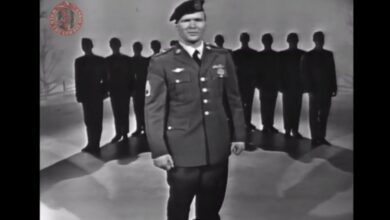Worn out, he delivered legendary tracks one last time for the audience’s adoration.
“Hello, I’m Johnny Cash.” This phrase was more than just a greeting; it was a powerful assertion of identity. Known affectionately as “The Man in Black,” Cash occupied a unique position in the realm of American music, recognized for his deep baritone voice and masterful storytelling. His songs went beyond mere tunes, serving as significant narratives that explored themes of love, struggle, and redemption. One of his early masterpieces, “Folsom Prison Blues,” released in 1955, epitomized these themes and set the tone for his extensive body of work. Through its poignant story of regret and yearning, Cash emerged as a spokesperson for the marginalized and disillusioned, representing the hardships faced by those often ignored by society.
Johnny Cash’s life was a rich tapestry woven with triumphs, battles, and personal demons. His ascent to stardom began in the mid-1950s when he signed with Sun Records, launching a series of hits that secured his legacy in music. Yet, Cash faced numerous challenges along the way, particularly struggles with substance abuse that shadowed his achievements and led to dark times. Rather than silencing him, these trials deepened his songwriting, adding layers to the themes of redemption and resilience that permeated his music. His ability to transform pain into art earned him a devoted following and widespread acclaim, as listeners resonated with his raw sincerity and authenticity.
Over the years, Cash’s musical style evolved, but the core themes of his work remained steadfast. He frequently explored subjects such as faith, love, and social justice, striking a chord with audiences. This evolution reached its zenith with his iconic concerts at prisons, notably the infamous Folsom State Prison in 1968, where he aimed to instill hope in inmates while sending a powerful message beyond prison walls. This moment proved pivotal in Cash’s career, underscoring his dedication to championing the plight of the underprivileged through his music. The live album captured at Folsom Prison became one of his most revered works, merging his passion for music with heartfelt themes of empathy and understanding.
A central element of Johnny Cash’s story is his deep bond with June Carter Cash. Their relationship began as a friendship rooted in admiration and evolved into a romantic partnership that significantly influenced their lives and careers. June, a formidable musician in her own right, played a crucial role in Cash’s battle against addiction. Their collaborations produced some of the most cherished duets in country music, including the timeless “Jackson.” The chemistry between them was undeniable, and their personal trials often echoed the issues they addressed in their songs, forging a personal connection with their audience.
The legacy of the Carter Family had a profound impact on Johnny Cash, especially through his marriage to June. The Carter Family, renowned for their foundational contributions to American folk and country music, provided a rich historical context for Cash’s artistic journey. June’s lineage, as a descendant of Maybelle Carter—a pioneer in the genre—shaped Cash’s career in significant ways. Together, they honored this legacy while carving their own unique path, blending traditional elements with contemporary sounds. Their partnership not only enriched their lives but also significantly influenced country music, intertwining their stories with those who came before them.
Johnny Cash’s final performance at the Carter Family Fold on July 5, 2003, held special significance, representing the culmination of his musical journey. Despite grappling with severe health issues like Shy-Drager syndrome, Cash demonstrated unwavering resolve as he took the stage. That night’s performance was a testament to his unbreakable spirit and his enduring love for music. Sharing the stage with June was likely bittersweet, especially after experiencing the recent loss of their partnership, yet together they created a poignant moment that resonated deeply with the audience.
Following that performance, Cash’s health continued to deteriorate, complicating his life further. The death of June just four months later added to his burdens. This challenging period was marked by profound sorrow, yet Cash remained connected to his music, finding solace in writing and recording. He released several significant albums during this time, including “American IV: The Man Comes Around,” featuring covers and originals that reflected on mortality and introspection. These works served both as a farewell and a celebration of his enduring legacy.
When Johnny Cash passed away on September 12, 2003, at the age of 71, the world mourned the loss of a remarkable artist. His music left a lasting impression on country music and beyond, influencing countless musicians across various genres. From rock to folk and punk, Cash’s work transcended boundaries, and his narrative style continues to inspire new generations of fans and artists alike. His legacy is a rich tapestry of resilience, love, and a deep connection to the human experience.
In the years that followed his passing, Johnny Cash’s posthumous recognition only solidified his status as a cultural icon. His life story, marked by romance, struggle, and eventual redemption, resonates deeply with people from all backgrounds. Biographies, documentaries, and films highlighting his life and music have emerged to keep his spirit alive, introducing his artistry to newer audiences. Cash’s songs, filled with poignant lyrics and evocative melodies, remain timeless, embodying the breadth of human emotion and experience.
This enduring influence prompts us to reflect on the power of music as a universal language capable of expressing the complexities of life. Johnny Cash epitomized this power, using it to convey stories of love, loss, and hope. Each note and lyric serves as more than mere entertainment; they offer profound insights into life itself. As we listen to his music today, we are reminded of the timeless nature of his messages, the compassion that fueled his art, and the lasting legacy of “The Man in Black,” a true legend whose voice will continue to echo throughout the annals of music history.





